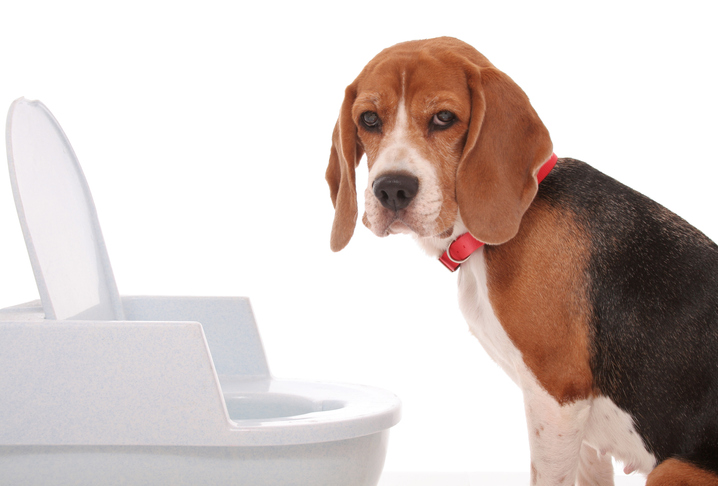If you have recently noticed your dog is suffering from diarrhea, you may be hoping for answers. Diarrhea is never fun, for you or your dog. Finding the cause is the first step to treating diarrhea. Your dog’s diarrhea could be coming from their diet, stress, or even an illness. It is important to figuring out what it causing the diarrhea in order to find out how to stop it.
What is Dog Diarrhea?
Diarrhea is unformed or loose stool. There are many causes for diarrhea including food eaten and health problems. Occasional diarrhea happens to everyone. However, if your dog is constantly dealing with diarrhea, there may be a bigger problem.

Causes of Diarrhea
There are three main categories for causes of diarrhea in dogs. Just like in humans, diarrhea can be caused by foods eaten, health problems, and stress. Diarrhea happens when fecal matter moves through the digestive tract quicker than normal. Decreased absorption of electrolytes, nutrients, and water also impact diarrhea.
Diet and Eating
Eating garbage or spoiled foods can cause diarrhea in dogs. Another key cause of diarrhea can be eating foods that are not healthy or that are toxic to dogs. Foods that are too rich or that are spicy can make dogs sick and cause diarrhea. Foods that are toxic include:
- Onions
- Garlic
- Chives
- Grapes
- Raisins
- Macadamia nuts
- Chocolate
- Coffee
- Alcohol
- Xylitol
Diarrhea can also be caused by small items that dogs have eaten. In addition, food allergies can cause diarrhea in dogs. Dogs’ food allergies are most often caused by proteins.
Lastly, changing your dog’s diet or treats can cause diarrhea. If you are introducing a new food and your dog starts having diarrhea, go back to what you were feeding them before. If the diarrhea goes away, you know the cause was the food.
Illness
There are many illnesses that have diarrhea as a symptom.
- Parasites
- Viruses
- Bacterial infections
- Inflammatory Bowel Disease
- Colitis
- Pancreatitis
- Liver disease
- Kidney disease
- Intestinal cancer
It is important to see your veterinarian if you suspect that your dog’s diarrhea is a sign of illness, or if the diarrhea continues for more than 2 days.
Stress
Stress can cause diarrhea in dogs. If you think stress is the cause of diarrhea, it is important to determine why your dog is stressed. Stress may be the cause if diarrhea seems tied to certain people, places, or events.
Symptoms of stress:
- Pacing
- Shaking
- Whining
- Barking
- Yawning
- Drooling
- Excessive licking
- Body language
- Excessive shedding
- Nibbling
- Biting
- Chewing
- Panting
Options for Treating Different Causes of Diarrhea in Dogs
Since diarrhea can have so many different causes, it is important to look at the many different solutions. In the following sections, you’ll find the treatment for the most common causes of diarrhea.
Garbage or Spoiled Food
Eating garbage or spoiled food can cause diarrhea in dogs. If your dog has diarrhea after getting into the trash or eating something you think might have expired, you may need to call an emergency vet. Small amounts of garbage or expired foods can make your dog mildly sick or severely sick. If your dog has diarrhea, but no other symptoms, then they are going to be fine and you just need to wait it out. If your dog is vomiting or has a fever, call an emergency vet.
Toxic Foods
Toxic foods can cause diarrhea in dogs. A small amount of these can cause vomiting and diarrhea. Depending on the amount of the food ingested you may need to call an emergency vet. If you are uncertain, call the vet. They can guide you in helping your dog.
Object Ingestion
If your dog ingests an object that is dissolvable and not toxic, they will work it out of their system. However, until it comes out they may suffer from severe diarrhea. If your dog ingests something small that does not dissolve, you may need to call a vet. If you are uncertain about the object, the safest decision is to call the vet and talk to them. They can help you decide if a removal surgery is necessary.
Food Allergies
If you suspect that your dog may have food allergies, the first step is to talk to your vet. Then you will want to try a special dog food and see if the diarrhea clears up. If your dog’s diarrhea is caused by food allergies, changing the food should help.
Diet Changes
If you have recently changed your dog’s diet, it can cause diarrhea. To treat diarrhea caused by a diet change, first change the food back to what they were originally eating. If the diarrhea goes away, do not return to the food that upset your dog’s stomach. If the diet change is something that was recommended by your vet, call your vet to talk to them about your options.
Antibiotics and Medications
If you have recently changed your dog’s medications and they start having diarrhea, call your vet about the changes. You may need to switch to another medication. If your dog accidentally eats your medication or supplements and has diarrhea, call a vet. They could have ingested something that is either toxic or disagrees with them.
Parasites
Parasites can cause diarrhea. If you suspect parasites or bugs as the cause your vet can run tests to check.
- Roundworms: There are several drugs available to treat roundworms. Your vet can recommend a treatment that typically takes a few days.
- Hookworms: Hookworms are also treatable. There are several drugs available that are inexpensive. Your vet can recommend one. Typically you will give your dog one dose and then another after a few weeks.
- Whipworms: Whipworms can be killed with a number of drugs that are available. Your vet can recommend one for you.
- Coccidia: To treat Coccidia your vet can prescribe sulfadimethoxine. There are other drugs in the works that are promising.
- Giardia: Giardia takes up to 10 days typically to complete treatment. Your vet can recommend and prescribe a good drug option.
Viruses
Similar to parasites and bugs, treatment for viruses depends on the virus. Your vet can recommend the best treatment once you have determined what your dog is dealing with. In many cases, you will have to treat the symptoms while your dog fights off the virus.
- Parvovirus
- Distemper
- Coronavirus
- Influenza
Bacterial infections
For bacterial infections, your vet can prescribe antibiotics and antibacterials. Depending on what your dog has, it may take a while for your dog to recover.
- Salmonella
- Leptospirosis
Inflammatory Bowel Disease
Inflammatory Bowel Disease, or IBS, is a chronic condition that can be treated but not cured. Your vet can recommend the best way forward if they determine that your dog’s diarrhea is being caused by IBS. Food and medications can be used to treat IBS.
Colitis
Colitis, like IBS, cannot be cured. It is a chronic condition that can be treated with diet and medications. Some dogs do better with a low-fiber diet while other dogs with colitis do better with a high-fiber diet. You and your vet may need to try a few different combinations until you find what works.
Pancreatitis
There is no cure for pancreatitis. However, if discovered and treated early, pancreatitis can be managed and put in remission. You may need to leave your dog with a vet hospital where they will care for your dog. Once your dog has recovered, the diarrhea should clear up.
Liver Disease
Your vet can help you make the best decision about how to treat your dog’s liver disease. In order to know if your dog’s diarrhea is caused by liver disease your vet can run some tests. Medications, diet, and surgery can help your dog recover.
Kidney Disease
There are many treatments for kidney disease. The treatments depend on the severity of the kidney disease. Your vet can help you decide what treatment is best for kidney disease and what medications and steps you can use to help your dog.
Stress
If stress is the cause of your dog’s diarrhea, the vet can discuss options with you. The first step is to try and figure out what your dog is stressed about. Once you know what your dog is stressed about, you will need to either remove the stressor or treat the stress with medications.
Talk with Your Veterinarian about Your Dog’s Diarrhea
Whatever causes your dog’s diarrhea, there is a treatment. Whether that is medication for an underlying condition or a diet change. In all cases, discussing it with your vet will help you understand the options available.
If your dog is having problems with diarrhea in Sonora, CA, call your Live Oak Veterinary Hospital vet at 209-432-9437 or book an appointment online!
